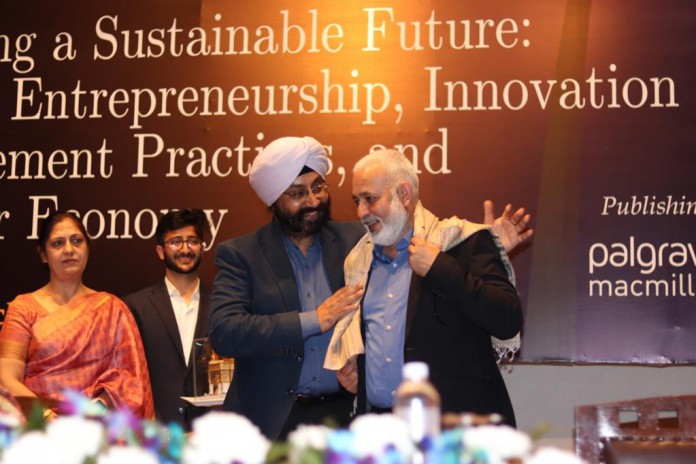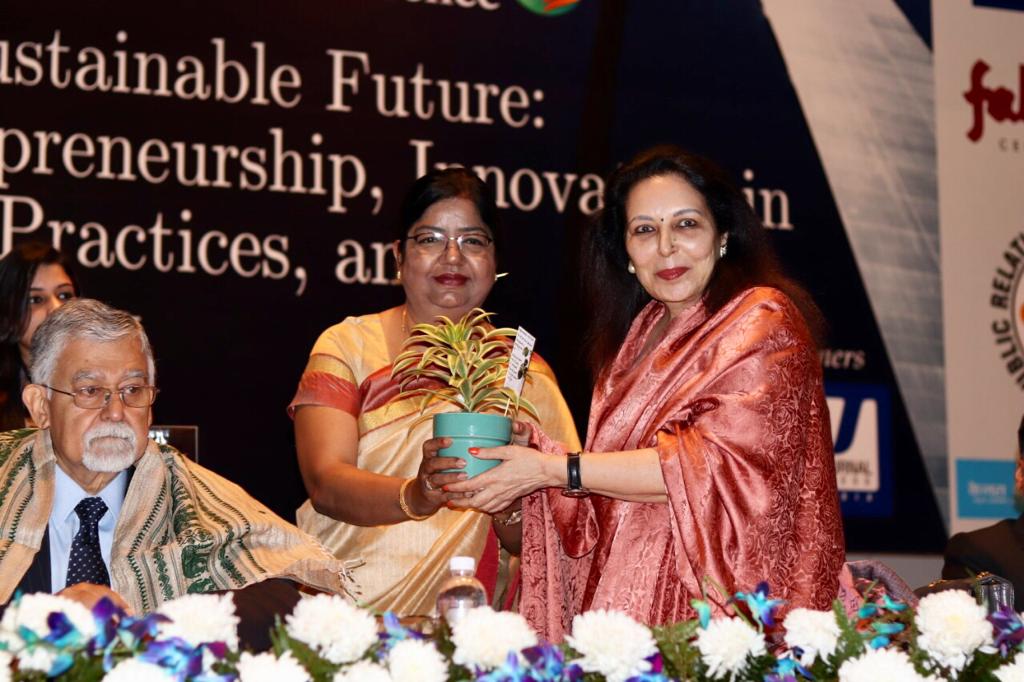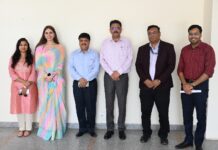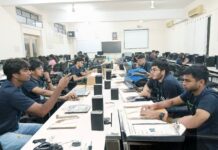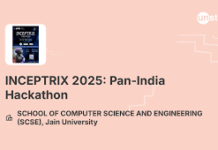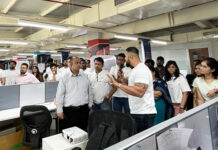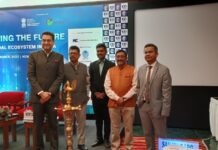Sri Guru Gobind Singh College of Commerce, University of Delhi organized the 5th edition of its Biennial International Conference on ‘Ensuring a Sustainable Future: Role of Entrepreneurship, Innovation in Management Practices, and Circular Economy’, in collaboration with Sydney Business School, University of Wollongong, Australia on 6th and 7th March, 2020. The conference witnessed the participation of many dignitaries, research scholars and faculty members from various universities of the country and abroad. Introducing the vision of the conference, the convener, Dr. Kawal Gill emphasized the necessity to explore new business models, to address sustainability issues around the world. Biennial International Conference She added that the conference aimed to reassess the role of innovators, entrepreneurs and collaborative efforts in ensuring a sustainable future.

Important Announcement – EasyShiksha has now started Online Internship Program “Ab India Sikhega Ghar Se”

In her video message, Professor Grace McCarthy, Dean, Sydney Business School, University of Wollongong, Australia, expressed her regret for not being able to attend the conference. She congratulated the organizing team and appreciated the relevance of the theme of the conference. Professor McCarthy highlighted the role of the educationists and researchers in making a difference with their insights and future collaborations.
The principal of the college, Dr. Jatinder Bir Singh in his inaugural address extended gratitude to the participants and pointed out that sustainability is an urgent international issue. He also emphasized on the need to analyze the accountability of various stakeholders, highlighting the role of policymakers and the market forces.
Top Courses in Software Engineering
In his keynote address, the chief guest, Dr. Arvind Virmani, Chairman, EGROW Foundation, charted the fluctuations in the Indian economy in short, medium and long term time frames. He attributed the current decline to improper phasing, bad timing and unplanned implementation of otherwise well-designed policies. He underscored the need for a collaborative role of the government, central institutions like RBI, and the upcoming resourceful entrepreneurs for building a strong economy.
The guest of honor, Ms. Bindu Dalmia, Chairperson, National Committee on Financial Inclusion and Literacy, Niti Aayog, stressed upon boosting innovation intensity in entrepreneurship and management practices. Industry 4.0 is expanding at an exponential rate as against the linear rate of earlier revolutions. Ms. Dalmia pointed out that the digital revolution is likely to replace labor in conservative economies and referred to the new employment platforms like Alibaba, Flipkart, and Uber. She suggested that India could gain immensely by increasing the level of digital literacy, and vocationalizing online learning. She concluded that navigating in a world of variables requires constant calibration.
Empower your team. Lead the industry
Get a subscription to a library of online courses and digital learning tools for your organization with EasyShiksha
Request NowQ. Are EasyShiksha's internships truly free?
Yes, all internships offered by EasyShiksha are completely free of charge.
Q. How can I apply for an internship with EasyShiksha?
You can apply by visiting our website, browsing available internships, and following the application instructions provided.
Q. What types of internships are available through EasyShiksha?
EasyShiksha offers a wide range of internships across technology, business, marketing, healthcare, and more. Opportunities are continuously updated.
Q. Will I receive a certificate upon completing an internship?
Yes, upon successful completion, you will receive a certificate recognizing your participation and achievements.
Q. Are EasyShiksha's internship certificates recognized by universities and employers?
Yes, the certificates are recognized by universities, colleges, and employers worldwide.
Q. Is the download of certificates free or paid?
Access to internships and courses is free, but there is a small fee to download certificates, covering administrative costs.
Q. When can I start the course?
You can choose any course and start immediately without delay.
Q. What are the course and session timings?
These are fully online courses. You can learn at any time and pace. We recommend following a routine, but it depends on your schedule.
Q. What will happen when my course is over?
After completion, you will have lifetime access to the course for future reference.
Q. Can I download the notes and study material?
Yes, you can access and download course materials and have lifetime access for future reference.
Q. What software/tools would be needed for the course?
All necessary software/tools will be shared during the training as needed.
Q. I’m unable to make a payment. What should I do?
Try using a different card or account. If the problem persists, email us at info@easyshiksha.com.
Q. Do I get the certificate in hard copy?
No, only a soft copy is provided, which can be downloaded and printed if required.
Q. The payment got deducted but shows “failed”. What to do?
Technical errors may cause this. The deducted amount will be returned to your account in 7-10 working days.
Q. Payment was successful but dashboard shows ‘Buy Now’?
Sometimes payment reflection is delayed. If it takes longer than 30 minutes, email info@easyshiksha.com with the payment screenshot.
Q. What is the refund policy?
If you face technical issues, you can request a refund. No refunds are issued once the certificate has been generated.
Q. Can I enroll in a single course?
Yes, select the course of interest, fill in the details, make payment, and start learning. You will also earn a certificate.
Q. My questions are not listed above. I need further help.
Contact us at info@easyshiksha.com for further assistance.
The last speaker of the session, Dr. D.K. Aggarwal, President, PHDCCI, spoke passionately about the sustainability of businesses and making India a 5 trillion economy.
The plenary session focused on a sustainable future from the practitioners’ perspective.
Ms. Anubha Prasad, National Coordinator, PAGE, UNEP, emphasized that circular economy and resource efficiency are vital for achieving sustainable development. She demonstrated how certain circular business models are already engaged in collaborative consumption, remanufacturing and dematerialization.
Ms. Gayatri Raghwa, Environment Education Consultant, UNEP, warned that the world has reached the ecological threshold.
Endeavoring to develop a low carbon economy is inadequate; we have to simultaneously provide green skills to our youth for the green collar jobs.
Mr. Manoj Kumar Keshwar, an entrepreneur and motorcycle explorer, shared his experiences gathered by traveling across the globe. He underscored the imperative need for re-thinking sustainability. He introduced project Atulya Ganga, initiated by army veterans, which aims to purify Ganga. He urged the audience to be a part of the initiative.
After the plenary session, nine parallel technical sessions, spread over two days, witnessed presentations of eighty-one research papers, including two student sessions.
These sessions witnessed various dimensions of entrepreneurship, management practices, and circular economy to ensure a sustainable future. Each technical session explored a specific aspect of Sustainable Development which included a circular economy, innovative management, various financial and economic factors etc.
Day 1 of the Biennial International Conference witnessed 4 technical sessions spread across different venues of the college. The sessions witnessed presentations of different research scholars and faculty.
Day 2 was no different with 5 technical sessions, 2 of which were of presented by student researchers, hence setting a foundation of a sustainable future.
Each technical session was chaired by 2 such session chairs which had years of experience of the subject of the session. Each presenter was given ample time to present their research. Once the presentation was over the house was open for cross-questioning from the attendees, fellow researchers and the session chairs. Each technical session concluded with the announcement of the best papers and valuable advice from the judges to all the presenters.
The event was finally concluded with a valedictory session to sum up the conference It consisted of farewell speeches from Dr. Kawal Gill (Convenor, Seminar Committee), Dr. J.B. Singh (Principal, SGGSCC) and other guests of honor.
The presenters of the best paper were honored and felicitated with certificates, presented by Dr. J.B. Singh and the guests of honor.
The conference finally ended on a high note with appreciation for all the faculty members and the entire team of seminar committee which made the dream of a successful event into a wonderful reality.
For information related to technology, visit HawksCode and EasyShiksha
ALSO READ: business-analyst-role
Get Course: Adobe-Photoshop-Your-Complete-Beginner-to-Advanced-Class





































